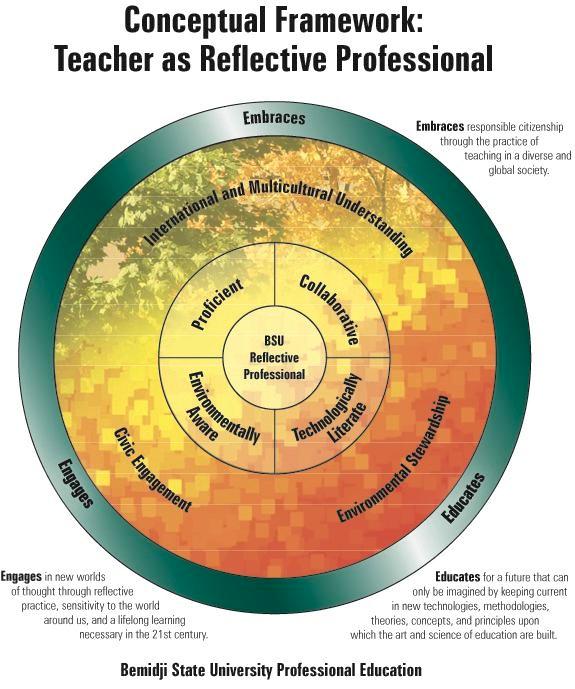The central aim of BSU’s Teacher Preparation Programs is to produce effective teachers who are reflective professionals and champions of multicultural understanding, civic engagement, and environmental stewardship.

Description of the Conceptual Framework
In order to achieve these aims, all of our programs adhere to an inquiry-based model that focuses on both theory and classroom application. Our curriculum examines the educational theories of such scholars as Bloom, Dewey, Gardner, Vygotsky, and Piaget as well as their application to teaching, as articulated by Danielson, Hammond-Darling, Maslow, and Prensky, among others. The Standards of Effective Practice serve as the outline for course articulations so that we can accurately and effectively assess our students’ progress.
21st Century Educators
In implementing the conceptual framework, we prepare teacher candidates who are: Proficient; Collaborative; Technologically Literate; and Environmentally Aware.
Proficiency
We encourage critical thinking, reflection, and problem solving so that our students can:
- display competence in their subject matter;
- understand the principles of learning and assessment;
- demonstrate the ability to model connections between philosophical foundations and best practices in the field; and
- engage in research and complex thinking.
As lifelong learners, Bemidji State University candidates demonstrate thoughtful analysis of the meaning and significance of their actions, decisions, and results with regard to their work. In addition, candidates use a variety of techniques to question their procedures and consider alternatives for instruction and student growth. Bemidji State University candidates are able to recognize learning, motivational, and developmental variables in their instructional practice and relate those dimensions to their teaching practices. A cooperating teacher commented:
[Candidate] demonstrated excellent knowledge of the mathematical concepts he was teaching. Students were always engaged in his class… I found every facet of my experience with [candidate] to be exceptional! From managing the classroom to creating an effective learning environment, he did an outstanding job. – Documentation from cooperating teacher, 2011
Collaboration
BSU graduates understand and value the personal and professional growth that can be achieved through collaborating with others. Neuman and King (2000) suggest that collaboration among professionals is key to meeting expectations placed on schools by society. By learning to work with colleagues, families, and community members to share expertise and resources, teachers are better positioned to provide an appropriate and meaningful education to students of all backgrounds, abilities, and needs. Our candidates are proficient in collaboration, as expressed in this report from a cooperating teacher:
What I will miss most about [Candidate] is the collaboration we have had. We have collaboration time each week to work with our team teachers on best practices. We go over data and teaching strategies as we seek to find data driven solutions to identified weaknesses within our students. [Candidate] has been a strong force and contributor in these meetings. – Documentation from cooperating teacher, 2011
Technological Literacy
The integration of technology in education implies a shift in the role of the teacher toward that of being a “broker” of knowledge and/or resources for learning as outlined in the constructivist philosophy (Persichitte, Cafarella & Tharp, 1999). At BSU, technology is not an add-on but an integrated strategy in our curricula and courses. Our faculty are committed to teaching candidates best practices for using technology in PreK-12 settings. BSU candidates:
- use educational technology in their own learning and apply their technological knowledge to their clinical field experiences;
- know how, when, and why to use instructional and assistive technology tools and techniques that support teaching and learning;
- understand that technology contributes to the learning environment, serves as a resource to address the educational needs of diverse learners, and supports a constructivist approach to teaching and learning.
Classroom teachers often testify about our students’ proficiency in using technology, for example:
[Candidate] gave my fellow department members and me some great new ideas about how to incorporate technology into our daily lesson plans to enhance our students’ learning. – Documentation from cooperating teacher, 2010
Environmental Awareness
At BSU, we value the environment in part because the main campus is close to the natural world. But we also understand that environmental awareness is a world-view that extends beyond the natural environment and recognizes that all living things are interdependent upon one another for emotional and intellectual survival. We strive to instill in all of our graduates the importance of being and teaching others to be socially and environmentally conscious. Environmental education cultivates critical thinking skills by:
- providing topics and problems that cut across the school curriculum and that enhance the integration of knowledge;
- providing real problems that can be studied or simulated; and
- providing topics and problems that can be adjusted to the developmental levels of students.
BSU candidates understand and take leadership responsibility for protecting the natural environment. They are prepared to integrate environmental content into appropriate curriculum for all levels of learners as they realize that the environment’s widespread appeal to students creates opportunities to nurture skills in areas such as language arts, math, science, and social studies.
Embrace, Engage, Educate
Bemidji State University teacher candidates are reflective educators who can effectively identify their own strengths and weaknesses, and adapt accordingly. Through faculty modeling and clinical experiences, our teacher candidates see and understand the importance of collaboration, and practice it in the field. Understanding that change is a constant, our candidates embrace change, keeping up with existing and emerging technologies while remaining environmentally aware. Technologically proficient, environmentally conscious, and skilled at collaboration, our teacher candidates are fully prepared to embrace diversity, engage communities and educate future generations.
We’ve developed partnerships with a number of PreK-12 public schools so that our students have plenty of hands-on learning experiences and opportunities for collaboration and reflection.
